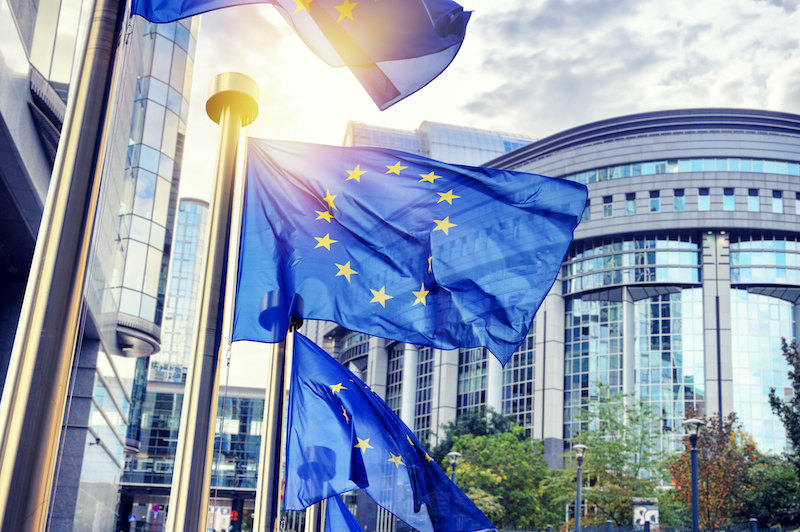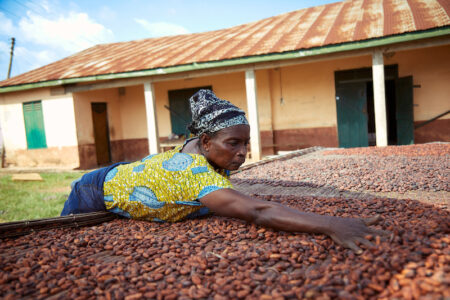EU report proposes due diligence action tackling major child labour issues in Ghana and Ivory Coast

EU flags waving in front of European Parliament building. Brussels, Belgium
An EU report into actions required to enable the ending of child labour within cocoa supply chains in Ghana and Ivory Coast has proposed a series of measures including delivering on due diligence schemes and increasing farmer payments, reports Neill Barston.
The studies from the European Commission revealed a number of concerning findings, including revelations that companies responsible for buying 50% of cocoa in the two West African nations have yet to engage with any sustainability initiatives designed to improve lives for key agricultural communities – meaning there was a complete lack of a level playing field in tackling the major interlinked issues of poverty, deforestation and wider human rights within the region.
According to the findings from the EU’s report, titled Ending Child Labour and Promoting Sustainable Cocoa Production in Ivory Coast and Ghana, some of its respondents working within the sector believed that the price paid to farmers would need to increase by a level of three or four times in order to make a meaningful impact on making a major impact on conditions.
This follows a study from Mondelez International last year that found that there was a $10 billion income gap in the West African cocoa farming sector, for the first time placing a true value on the scale of the task facing the region’s governments, civil society and companies working within the industry serving the broader confectionery and chocolate market segments.
In its report, which centred on the $130 billion chocolate industry, of which Ghana and Ivory Coast account for roughly two thirds of production, the EU said: “To bring about real change, a comprehensive, legally binding framework and collective action plans are necessary. They should be well integrated and aligned to cocoa producing and EU member government policies and to relevant corporate policies and practices in order to be effective. They should also include agreed due diligence mechanisms. In this respect, due diligence should be an obligation on all companies that place cocoa or cocoa products on the EU market, as key cocoa industry stakeholders have indicated.”
The EU study also stressed the need to provide a common framework through which all cocoa value chain stakeholders are required to show how they identify and mitigate human rights and environmental risks. This includes all actors, including SMEs. Furthermore, due diligence needs to cover not just industry but also the cocoa producer countries themselves. Producer countries have a critical role and responsibility in ensuring that cocoa value chains are free from child labour and that deforestation is halted.
In addition, they need to guarantee that all other ratified ILO fundamental principles and human rights, including child rights, are respected. The research has found that stakeholders view the issue of due diligence as very critical, and comes amid the UN’s designated year of eradicating child labour globally – with 160 million minors affected by the issue globally across all spheres of industry and agriculture (with around 1.5 million in West Africa).
According to the EU’s report, interviewees drawn from key industry stakeholders and cocoa-producing government researchers agree that some mandatory as well as voluntary agreements will be needed. They suggested that such agreements need to focus on bilateral agreements with the Côte d’Ivoire and Ghana governments as well as with industry.
The study praised the introduction by the Ivory Coast and Ghanaian government of Living Income Differential (LID) payments brought in last October, amounting to $400 a tonne to the farmgate prices paid to those in the sector, but significantly, market pressures including global uncertainties arising from the coronavirus pandemic, and concerns surrounding cocoa oversupply within the region, led the Ivory Coast Government in particular to reduce payments to cocoa communities by 25% – effectively wiping out any potential gains from the LID system.
Tellingly, the EU report said that despite efforts undertaken so far by industry, government and civil society, ‘the general impact of existing and previous child labour initiatives to reduce poverty has been evaluated as low,’ with a significant scaling up of actions being deemed necessary.
Specific proposals
Consequently, the EU put forward a range of specific proposals on the issue. These included Improving existing partnerships and cross-border agreements among the Economic Community of West Africa States (ECOWAS) – Côte d’Ivoire, Ghana, Burkina Faso, and Mali, as well as scaling up agreements and implementation of initiatives for the identification, return and reintegration of trafficked children to return home to Burkina Faso and Mali.
The EU also called for greater alignment of corporate practices in relation to labour practices, as well as human rights guidance.
Other key areas of focus included strengthening the legal, regulatory frameworks and institutions, and ensure improved enforcement to eliminate child labour. It also called for the development and expansion of well targeted social protection mechanisms to help protect from environmental, health, social and other shocks (which lead to higher dependence on child labour). Linked to this is the integration of child labour monitoring and remediation systems into child protection systems.
Further improvements to general public infrastructure, including roads, schools, health and child protection services were cited as being critical to delivering change for the two nations. There were further country-specific recommendations including in Ivory Coast providing for birth registration of multi-generational immigrants and children of unknown parents. Meanwhile in Ghana, the EU believed there should be reform of the Ghana Cocoa Board, and analysis of how illegal mining is further impacting on the cocoa sector.



